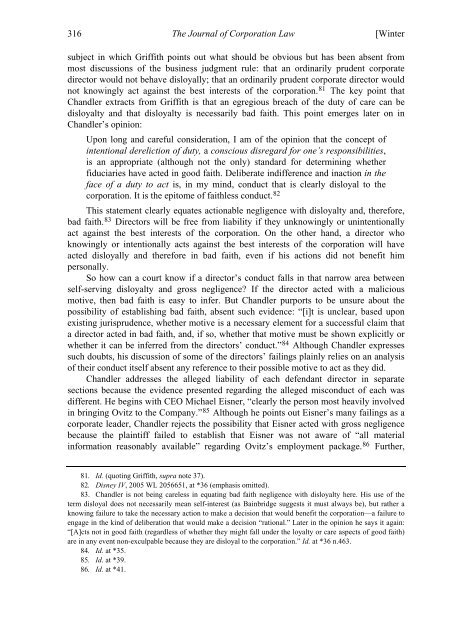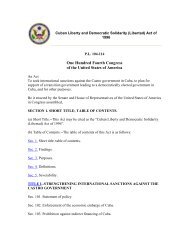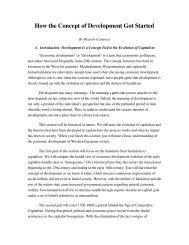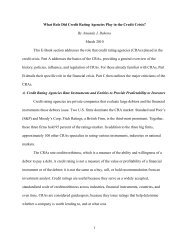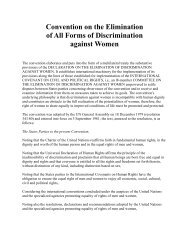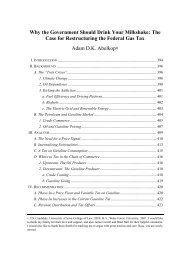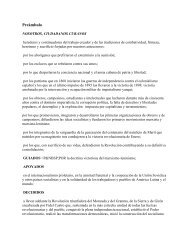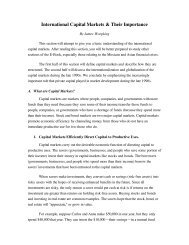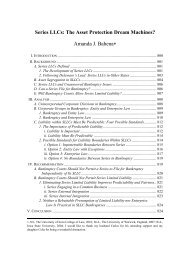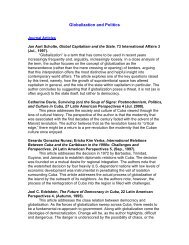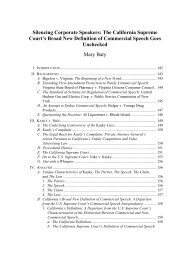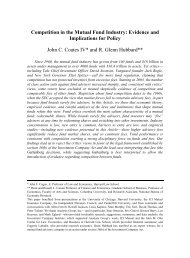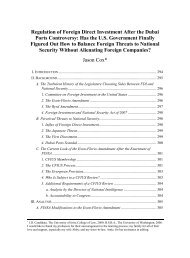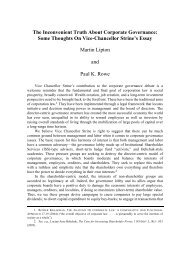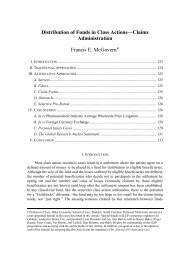Galactic Stupidity and the Business Judgment Rule - College of Law
Galactic Stupidity and the Business Judgment Rule - College of Law
Galactic Stupidity and the Business Judgment Rule - College of Law
Create successful ePaper yourself
Turn your PDF publications into a flip-book with our unique Google optimized e-Paper software.
316 The Journal <strong>of</strong> Corporation <strong>Law</strong> [Winter<br />
subject in which Griffith points out what should be obvious but has been absent from<br />
most discussions <strong>of</strong> <strong>the</strong> business judgment rule: that an ordinarily prudent corporate<br />
director would not behave disloyally; that an ordinarily prudent corporate director would<br />
not knowingly act against <strong>the</strong> best interests <strong>of</strong> <strong>the</strong> corporation. 81 The key point that<br />
Ch<strong>and</strong>ler extracts from Griffith is that an egregious breach <strong>of</strong> <strong>the</strong> duty <strong>of</strong> care can be<br />
disloyalty <strong>and</strong> that disloyalty is necessarily bad faith. This point emerges later on in<br />
Ch<strong>and</strong>ler’s opinion:<br />
Upon long <strong>and</strong> careful consideration, I am <strong>of</strong> <strong>the</strong> opinion that <strong>the</strong> concept <strong>of</strong><br />
intentional dereliction <strong>of</strong> duty, a conscious disregard for one’s responsibilities,<br />
is an appropriate (although not <strong>the</strong> only) st<strong>and</strong>ard for determining whe<strong>the</strong>r<br />
fiduciaries have acted in good faith. Deliberate indifference <strong>and</strong> inaction in <strong>the</strong><br />
face <strong>of</strong> a duty to act is, in my mind, conduct that is clearly disloyal to <strong>the</strong><br />
corporation. It is <strong>the</strong> epitome <strong>of</strong> faithless conduct. 82<br />
This statement clearly equates actionable negligence with disloyalty <strong>and</strong>, <strong>the</strong>refore,<br />
bad faith. 83 Directors will be free from liability if <strong>the</strong>y unknowingly or unintentionally<br />
act against <strong>the</strong> best interests <strong>of</strong> <strong>the</strong> corporation. On <strong>the</strong> o<strong>the</strong>r h<strong>and</strong>, a director who<br />
knowingly or intentionally acts against <strong>the</strong> best interests <strong>of</strong> <strong>the</strong> corporation will have<br />
acted disloyally <strong>and</strong> <strong>the</strong>refore in bad faith, even if his actions did not benefit him<br />
personally.<br />
So how can a court know if a director’s conduct falls in that narrow area between<br />
self-serving disloyalty <strong>and</strong> gross negligence? If <strong>the</strong> director acted with a malicious<br />
motive, <strong>the</strong>n bad faith is easy to infer. But Ch<strong>and</strong>ler purports to be unsure about <strong>the</strong><br />
possibility <strong>of</strong> establishing bad faith, absent such evidence: “[i]t is unclear, based upon<br />
existing jurisprudence, whe<strong>the</strong>r motive is a necessary element for a successful claim that<br />
a director acted in bad faith, <strong>and</strong>, if so, whe<strong>the</strong>r that motive must be shown explicitly or<br />
whe<strong>the</strong>r it can be inferred from <strong>the</strong> directors’ conduct.” 84 Although Ch<strong>and</strong>ler expresses<br />
such doubts, his discussion <strong>of</strong> some <strong>of</strong> <strong>the</strong> directors’ failings plainly relies on an analysis<br />
<strong>of</strong> <strong>the</strong>ir conduct itself absent any reference to <strong>the</strong>ir possible motive to act as <strong>the</strong>y did.<br />
Ch<strong>and</strong>ler addresses <strong>the</strong> alleged liability <strong>of</strong> each defendant director in separate<br />
sections because <strong>the</strong> evidence presented regarding <strong>the</strong> alleged misconduct <strong>of</strong> each was<br />
different. He begins with CEO Michael Eisner, “clearly <strong>the</strong> person most heavily involved<br />
in bringing Ovitz to <strong>the</strong> Company.” 85 Although he points out Eisner’s many failings as a<br />
corporate leader, Ch<strong>and</strong>ler rejects <strong>the</strong> possibility that Eisner acted with gross negligence<br />
because <strong>the</strong> plaintiff failed to establish that Eisner was not aware <strong>of</strong> “all material<br />
information reasonably available” regarding Ovitz’s employment package. 86 Fur<strong>the</strong>r,<br />
81. Id. (quoting Griffith, supra note 37).<br />
82. Disney IV, 2005 WL 2056651, at *36 (emphasis omitted).<br />
83. Ch<strong>and</strong>ler is not being careless in equating bad faith negligence with disloyalty here. His use <strong>of</strong> <strong>the</strong><br />
term disloyal does not necessarily mean self-interest (as Bainbridge suggests it must always be), but ra<strong>the</strong>r a<br />
knowing failure to take <strong>the</strong> necessary action to make a decision that would benefit <strong>the</strong> corporation—a failure to<br />
engage in <strong>the</strong> kind <strong>of</strong> deliberation that would make a decision “rational.” Later in <strong>the</strong> opinion he says it again:<br />
“[A]cts not in good faith (regardless <strong>of</strong> whe<strong>the</strong>r <strong>the</strong>y might fall under <strong>the</strong> loyalty or care aspects <strong>of</strong> good faith)<br />
are in any event non-exculpable because <strong>the</strong>y are disloyal to <strong>the</strong> corporation.” Id. at *36 n.463.<br />
84. Id. at *35.<br />
85. Id. at *39.<br />
86. Id. at *41.


